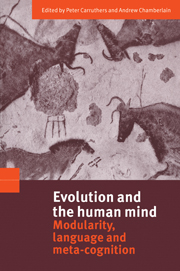Book contents
- Frontmatter
- Contents
- List of contributors
- Preface
- 1 Introduction
- 2 Massively modular minds: evolutionary psychology and cognitive architecture
- 3 Individual differences in early understanding of mind: genes, non-shared environment and modularity
- 4 Darwin in the madhouse: evolutionary psychology and the classification of mental disorders
- 5 Evolution of the modern mind and the origins of culture: religious concepts as a limiting-case
- 6 Symmetry and the evolution of the modular linguistic mind
- 7 Evolution, communication and the proper function of language
- 8 The evolution of knowledge
- 9 Mind, brain and material culture: an archaeological perspective
- 10 The evolution of strategic thinking
- 11 On the origin of the human mind
- 12 The evolution of consciousness
- 13 Evolution, consciousness and the internality of the mind
- References
- Author index
- Subject index
8 - The evolution of knowledge
Published online by Cambridge University Press: 18 December 2009
- Frontmatter
- Contents
- List of contributors
- Preface
- 1 Introduction
- 2 Massively modular minds: evolutionary psychology and cognitive architecture
- 3 Individual differences in early understanding of mind: genes, non-shared environment and modularity
- 4 Darwin in the madhouse: evolutionary psychology and the classification of mental disorders
- 5 Evolution of the modern mind and the origins of culture: religious concepts as a limiting-case
- 6 Symmetry and the evolution of the modular linguistic mind
- 7 Evolution, communication and the proper function of language
- 8 The evolution of knowledge
- 9 Mind, brain and material culture: an archaeological perspective
- 10 The evolution of strategic thinking
- 11 On the origin of the human mind
- 12 The evolution of consciousness
- 13 Evolution, consciousness and the internality of the mind
- References
- Author index
- Subject index
Summary
Human beings are one of the great success stories of evolution. They have spread over the globe and refashioned much of it to their own convenience. What has made this possible? Perhaps there is no one key which alone explains why humans have come to dominate nature. But a crucial part has surely been played by our high potential for theoretical rationality. Human beings far surpass other animals in their ability to form accurate beliefs across a wide range of topics, and many aspects of human civilisation rest on this accomplishment. My aim in this chapter will be to explain this ability from an evolutionary perspective. I want to understand how creatures with our biological history came to be so good at theoretical rationality.
Introduction
The claim that humans are good at theoretical rationality is not entirely uncontroversial. Much recent psychological research suggests that humans are far less good at forming accurate beliefs than you might initially suppose. I shall discuss this research at some length below. It raises many interesting issues and will force me to be more specific about the precise sense in which humans possess a high level of theoretical rationality. But this research does not in the end undermine the claim that humans do have a high degree of theoretical rationality, nor that this has played an important role in human development.
Evolutionary explanations do not always account for traits in terms of elective advantages they provide.
- Type
- Chapter
- Information
- Evolution and the Human MindModularity, Language and Meta-Cognition, pp. 170 - 206Publisher: Cambridge University PressPrint publication year: 2000
- 12
- Cited by



